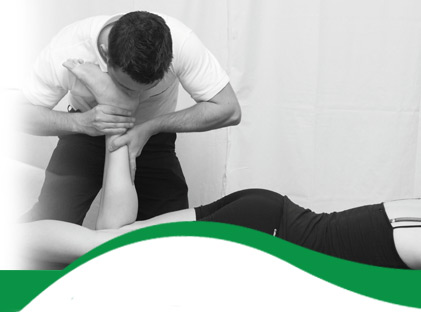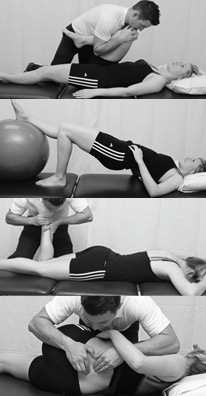The Seven Hills physiotherapists believe physiotherapy can only be succesful if you are given the opportunity to fully explain the extent of your problems. The green questions in the right column of this page have been designed to make you think about your symptoms, impairments, and activity and participation loss. This way of working provides a structure that allows you to tell us the finest details of your symptoms through to the much bigger picture of how aspects of your life as a whole are being affected. It is then our job to provide the specialist physiotherapy to help ALL your reported problems. Only by understanding the full extent of your problems can we change your yes answers into no answers.
Physiotherapy works to make your life more comfortable (symptoms) and enjoyable (activity and participation) by working on the causes of your complaints (movement impairments)
Physiotherapy is a profession that optimises the movement and function of your body. Restoring human movement has been scientifically and experientially proven to reduce your symptoms and improve your body's ability to perform the activities that you report have become difficult.
1) What are the causes of your symptoms?
Pain or other unpleasant symptoms are the most common reasons for a person to seek help from a physiotherapist. Following an injury, pain acts as an alarm system to warn you a structure is damaged. This helps the structure heal over time as the unpleasant experience of pain prevents you from placing too much stress on the damaged structure whilst it is still healing.
However, experience has taught us the majority of people suffer pain for reasons unknown to them. In this instance, your alarm system (pain) acts as a warning that a structure MAY be at risk of damage. This may simply be due to parts of your body becoming stiff or tight or weak through poor posture, altered movement patterns, overuse or even not using parts of the body enough. Your body is able to adapt and tolerate this improper use for so long until eventually it tells you enough is enough by activating its warning alarm system, pain. The majority of people who seek physiotherapy advice after feeling pain for unknown reasons suffer due to improper use NOT damage.
2) The role of impairments in ongoing symptoms.
You may have suffered an injury in the past that has resolved on its own over a course of time. This is common due to your body's ability to deactivate its alarm system when it is happy the injured structure has healed. However, in some circumstances pain may persist well beyond the expected healing times. This is known as chronic pain. Impairments (stiffness, weakness etc) are often found to be the cause of ongoing symptoms after damaged tissue has healed. Alternatively, you may have suffered no injury at all and, as explained above, movement impairments may be responsible for pain in the first instance.
A structure in your body may be stiff, tight, weak or not being supported by the structures around it. These are all known as impairments. They can occur without injury or damage to the structures. These impairments are recognised as a health risk by your body. If left untreated your body's alarm system will let you know it is not happy with this situation by sounding the alarm system, pain or a similar unpleasant sensation. Symptoms caused by impairments are much less likely to resolve without help as the cause of the symptoms (stiffness, tightness, weakness) needs to be taken away before your body can be confident it is safe to switch off the alarm system.
3) The role of symptoms and impairments in activity and participation reduction.
Activites and participation may become suddenly affected in the case of an injury. Protective symptoms and movement restriction will make activities and participation difficult.
However, in the case of slow and progressive symptoms and impairments it may be months or even years before activity and participation become affected. Unfortunately, it is likely if left untreated this will eventually be the case. Worsening symptoms and movement make activities difficult. As these activities become even more difficult you will begin to reduce your participation in social activities such as hobbies, interests and work.
4) The role of a medical diagnosis in symptoms, impairments, activity and participation.
You may have been given a diagnosis such as frozen shoulder, tennis elbow, cervical spondylosis, trapped nerve or sciatica. All these diagnoses fit nicely into the ICF way of thinking. If you have been given a medical diagnosis try it for yourself. Do the green questions still apply to your problem? It is likely they do. Your medical diagnosis is helpful in predicting your expected outcome and may serve as a guideline when selecting the most up to date treatments for you. However, your care will be tailored to your needs and we will still search for movement impairments that may be contributing to your symptoms, activity loss and participation difficulties.
How does physiotherapy treatment turn those 'yes' answers into 'no' answers?
Seven Hills Physiotherapy works to make your life more comfortable (symptoms) and enjoyable (activity and participation) by working on the causes of your complaints (movement impairments). We carefully listen to the details of your symptoms and discover whether you are suffering any activity or participation difficulties. Our physiotherapists then use a vast array of current treatment techniques to restore movement and health to your body’s structures. It is important to remember your alarm system (pain) was switched on in the first place because your structures told your brain there MAY be a risk of damage to them. Physiotherapy treatment aims to remove this risk by improving the health of the structures and improving the movement of the body. As a result the structures become happy so they no longer tell your brain there may be a risk of damage. Therefore, the brain switches off the alarm system (pain). With pain reduced or abolished, movement improves. By taking away these two common problems there are now no reasons why you can’t return to the activities (activity) and hobbies (participation) these problems prevented you from doing in the first place. Please feel free to read our testimonials to see how our way of working has not only improved the symptoms of previous patients but also given them their life back.
Do parts of your body cause you pain, ache, feel stiff, or seem weak or unstable?
Do parts of your body cause you pins and needles, tingling, burning, or feel numb?
Do any of these complaints prevent your body from moving or working how it should?
Do any of these complaints disturb your sleep or make it difficult to relax?
Do any of these complaints or loss of movement in your body mean there are things in your life that you struggle to do or can’t do at present?
Do you feel your life would be more comfortable and enjoyable if somebody could help you with these complaints?
If you answered YES to any, or all, of these questions then the Seven Hills Physiotherapy team are here to help. We will take great interest in listening to YOUR problems so we can find out how YOU would like us to help YOU lead a more comfortable and enjoyable life.






